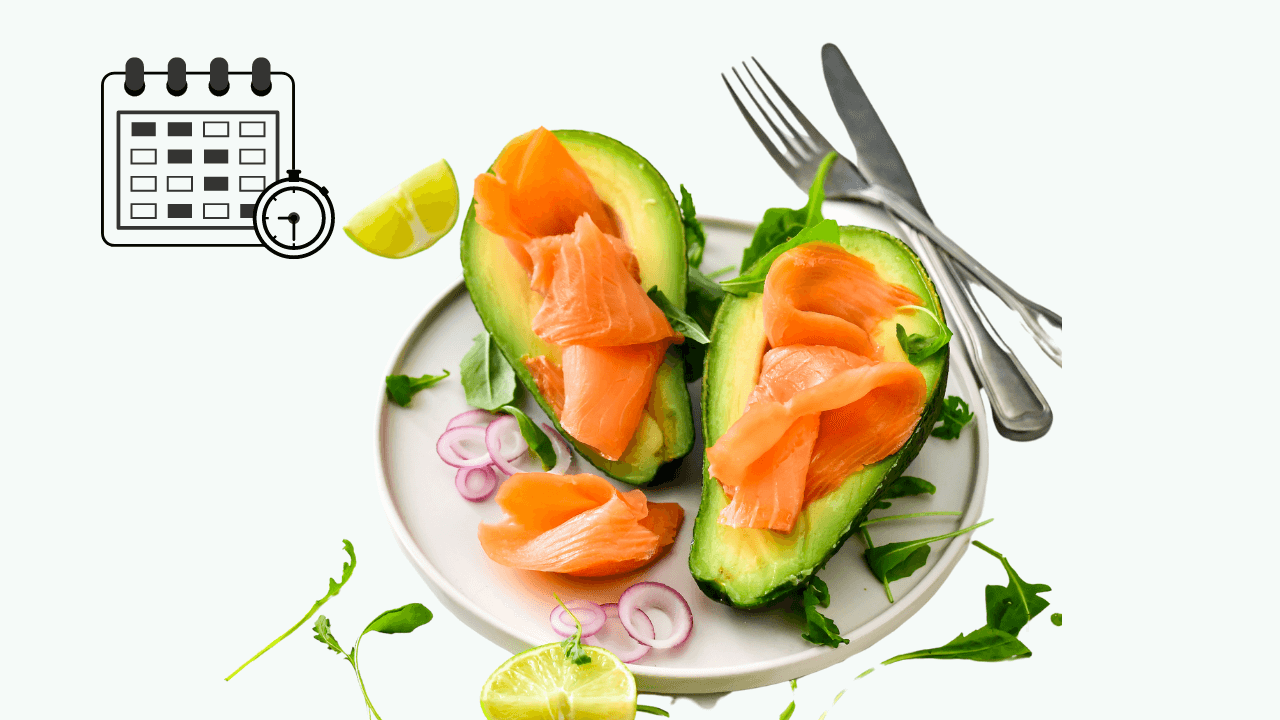

Ketosis is a metabolic state characterized by the body’s utilization of ketones, which burn stored fat instead of glucose for energy production. People looking to lose body fat or weight often try ketosis by following a low-carb, high-fat diet.
However, the timeframe taken to enter ketosis may vary among people, and factors like dietary choices, activity levels, and individual metabolism could influence it.
Ketosis may offer multiple health benefits, such as improved blood sugar control, increased fat burning, and improved weight loss control.
This article will provide an understanding of ketosis, the time it takes to enter it, and foods that support ketosis. It will also weigh the health benefits and potential health risks associated with following a ketogenic diet.
Ketosis is a dietary strategy where the body breaks down fat and produces ketones as a byproduct. The presence of ketones in the body indicates that ketosis has been achieved. Following a high-fat, low-carb ketogenic diet could help you achieve ketosis.
Ketosis is associated with several health benefits, including improved blood sugar control, weight loss, and increased energy and focus.
People on a ketogenic diet (to achieve ketosis) may experience rapid weight loss up to 10 pounds within two weeks. However, factors like metabolism, age, and physical activity may influence the weight loss rate.

Achieving a ketogenic state requires limiting total carbohydrate intake to not more than 50 grams a day. Such carbohydrate restriction allows the body to burn stored fat for energy.
Consuming more than 50 grams of carbohydrates daily could disrupt the ketosis process and prevent the body from entering a fat-burning state (ketosis).
You may derive minimal carbohydrates from nonstarchy vegetables like cauliflower, green beans, spinach, or broccoli. Food like eggs, seafood, nuts, seeds, or berries could be consumed in moderation. These food sources may help keep you within your required carb goals.
Restricting carbohydrate intake to 20-50 grams daily helps deplete glycogen reserves in the body, forcing it to switch to burning fat for fuel. By keeping carbs low, the body enters a state of ketosis, producing and utilizing ketones for energy.
Consuming more than 50 grams of carbs a day may cause blood sugar levels to rise, potentially striking the body out of ketosis.
Keeping carb intake within the recommended range could stabilize blood sugar levels, allowing the body to continue burning fat for fuel.
Carbohydrate consumption triggers insulin release, a hormone that promotes fat storage. Limiting carb intake between 20-50 grams daily minimizes insulin release, allowing the body to tap into its fat stores and encourage weight loss.
People on a keto diet may track their carbohydrate intake by counting the “net carbs” in their consumed foods. It is calculated by deducting the fiber from the total carbohydrate count. Such tracking may help you stay within the optimal carbohydrate range to attain ketosis.
Attaining ketosis requires a dietary pattern comprising high fat intake, moderate protein consumption, and low carb intake. It involves 55-60% calories from fat sources, while the remaining 30% is from protein and 5-10 % is from carbs.
Consuming excessive protein could potentially interfere with the process of ketosis. However, it is important to strike a balance regarding protein consumption.
Here are some points to consider when it comes to protein intake on a ketogenic diet:
Here are some points to consider when it comes to protein intake on a ketogenic diet:
| Key Points | Information |
|---|---|
| Recommended protein amounts | The recommended amount of protein can vary, but a standard suggestion is consuming approximately 1 gram of protein/pound of body weight daily. People who engage in heavy exercise may require slightly more protein, at around 1.5 grams per pound. |
| Mixed evidence | There is mixed evidence regarding the need for lowering protein intake on a ketogenic diet. Some people believe that reducing protein is necessary to achieve and maintain ketosis. However, more research is needed to understand the optimal protein intake for ketosis. |
| Striking the right balance | It is essential to strike the right balance between protein and fat intake on a ketogenic diet. Consuming too much protein may potentially increase insulin levels and inhibit ketosis. |
Testing ketone levels is essential for accurately determining and monitoring how near you may be to achieving ketosis. Three standard methods for testing ketone levels are:
Intermittent fasting is a dietary approach that might induce ketosis and involves alternating periods of eating and fasting. The fasting periods might range from a few hours to several days, in which the body depletes its glycogen stores and burns stored fat, initiating ketosis.
It may be effective in promoting ketosis and could help manage diabetes and cardiovascular disease and aid weight loss. However, more research is required to confirm these benefits and determine the long-term safety and efficacy of intermittent fasting.
MCT oil contains fatty acids easily absorbed and metabolized by the body. Unlike long-chain triglycerides, MCTs could bypass the normal digestive process and provide a direct source of ketones.
It could enhance the production of ketones, the primary fuel source in ketosis. MCT oils might improve the body’s ability to enter and maintain ketosis.
MCT oil may expedite the transition into ketosis by increasing ketone concentration in the body. Such effects may benefit people who consume less fat and more protein and carbs than a typical keto diet.
It may provide an immediate energy source for the body, possibly enhancing mental clarity, reducing carbohydrate cravings, and improving exercise performance. MCT oil may also assist in weight loss.
The ketogenic (keto) diet is a moderate-protein, high-fat, and low-carbohydrate dietary approach. It shifts the body’s fuel source from carbohydrates to fat, inducing ketosis. A standard keto diet should comprise 10%–20% proteins, 70–80% fats, and 5%-10% carbohydrates.
The keto diet has multiple variations, such as cyclical, targeted, high protein, or standard ketogenic. The nutrient needs and food types may depend on the ketogenic diet you opt for.
Foods that provide healthy fats, like meats, fish, eggs, nuts, seeds, cream, and oils, are emphasized in this diet. Food sources like sugary foods, alcohol, high-carb foods, or processed foods are excluded from the keto diet plan.
Ketosis could reduce hunger cravings and promote fat burning, helping people consume fewer calories. Such properties could help shed excess body fat and aid weight loss. Achieving ketosis could target belly fat reduction while preserving lean muscle mass.
It has shown promise in treating and managing various medical conditions. For people with epilepsy, the ketogenic diet might be used as a therapeutic approach to reduce seizures. The diet modifies the brain’s excitability, leading to a reduction in seizure activity.
Ketosis could enhance focus and energy levels. The brain may work more efficiently on ketones as an alternative fuel source than glucose. This metabolic state also subsides inflammation, which may contribute to improved cognitive function.
Achieving ketosis may have potential benefits in mitigating the severity of neurological conditions like autism, Alzheimer’s disease, and brain cancers like glioblastoma.
Type 2 diabetes patients may also benefit from ketosis as it could aid in weight loss and help improve blood sugar control. By reducing carbohydrate intake, the ketogenic diet helps mitigate blood glucose levels and enhance insulin sensitivity.
Recommended: Are Beans Keto? All Facts & Info 2024
A ketogenic diet may lack fiber as it focuses on increasing the intake of healthy fats. The reduced fiber and carb consumption in ketosis might stress the gallbladder, leading to diarrhea.
Restrictions on carbohydrate intake might result in fiber deficiency, possibly contributing to digestive issues. Increasing fiber consumption through foods like leafy greens and drinking adequate water may reduce diarrhea complications.
Ketoacidosis might occur in people with diabetes who are following the ketogenic diet. It leads to an overly acidic blood pH.
Diabetes-related ketoacidosis (DKA) may occur when the body lacks insulin and produces ketones excessively. It might lead to a dangerous drop in blood pH, putting vital organs like the liver, kidneys, and brain at risk.
People with diabetes who are considering the ketogenic diet should consult a doctor before starting and closely monitor their blood sugar levels.
The restrictive nature of the keto diet eliminates many high-carb foods, making it difficult to maintain long-term. Such effects may lead to feelings of deprivation and potentially result in overeating and consuming higher amounts of calories. As a result, weight gain may occur.
Post-ketosis, when carbohydrates are reintroduced, the body may retain water. Such water retention may cause temporary weight gain.
A ketogenic diet might contribute to disordered eating patterns. Focusing on strict macronutrient ratios and eliminating entire food groups may cause an unhealthy relationship with food. It may result in a cycle of restriction and overeating, potentially contributing to weight gain over time.
During the initial days of following a ketogenic diet, you may experience adverse symptoms commonly known as the ‘Keto Flu.’ These symptoms resemble the flu and may include nausea, digestive discomfort, fatigue, and lethargy.
A Ketogenic diet may sometimes cause muscle mass, negatively affecting metabolism and long-term weight management.
Carbohydrate restriction forces the body to utilize stored fat for energy production. However, the body could break down muscle tissue for energy without sufficient carbohydrates. It may lead to reduced muscle mass over time.
Generally, it takes around two to four days to enter ketosis, provided you consume between 20 and 50 grams of carbohydrates daily. However, it is essential to note that the time to reach ketosis differs for everyone. Some people may take a week or longer to attain ketosis.
Typically, it takes around 2–4 days to enter ketosis, and some people may take a week or even more to attain it. Factors like metabolism, current dietary intake, age, and exercise frequency may influence the ketosis timeline.
Consuming low-carb foods like leafy greens, seafood, dairy products, berries, and nuts may help you attain ketosis. Achieving ketosis could aid weight loss, control blood sugar, and improve body composition.
However, you might encounter signs of flu, commonly known as the “keto flu.” when starting a ketogenic diet. These symptoms may include fatigue, nausea, or digestive discomfort. If the side effects persist or deteriorate, consult a doctor immediately.
Tyler Read earned an undergraduate academic degree from Sonoma State University, California and is a certified personal trainer (CPT) with NASM (National Academy of Sports Medicine). With over 16 years of experience, Tyler has trained clients both online and in-person.
He is passionate about helping others turn their love for fitness into a career. Tyler has worked with many local and commercial gyms before establishing his successful private personal training business, which he continues to operate.
